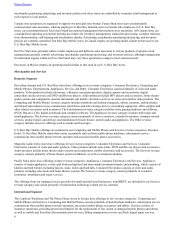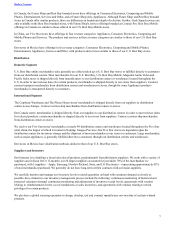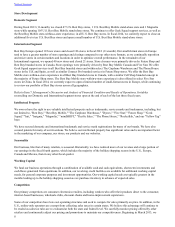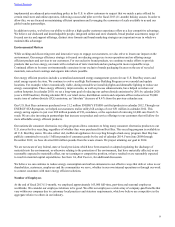Best Buy 2013 Annual Report Download - page 15
Download and view the complete annual report
Please find page 15 of the 2013 Best Buy annual report below. You can navigate through the pages in the report by either clicking on the pages listed below, or by using the keyword search tool below to find specific information within the annual report.
15
Changes to the National Labor Relations Act or other labor-related statutes or regulations could have a material
adverse impact on our costs and impair the viability of our operating model.
The National Labor Relations Board continually considers changes to labor regulations, many of which could significantly
impact the nature of labor relations in the U.S. and how union elections and contract negotiations are conducted. In 2011, the
definition of a bargaining unit changed, making it possible for smaller groups of employees to organize labor unions.
Furthermore, there are pending representation election rules changing the union election process and shortening the time
between the filing of a petition and an election being held. Additional changes are anticipated in 2013. As of February 2, 2013,
none of our U.S. operations had employees represented by labor unions or working under collective bargaining agreements.
Changes in labor-related statutes or regulations could increase the percentage of elections won by unions, and employers of
newly unionized employees would have a duty to bargain in good faith over matters such as wages, benefits and labor
scheduling, which could increase our costs of doing business and materially adversely affect our results of operations.
Additional legislation or regulatory activity relating to environmental matters could have a material adverse impact on
our costs or disrupt our operations.
Environmental legislation or other regulatory changes could impose unexpected costs or impact us more directly than other
companies due to our operations as a global retailer. Specifically, environmental legislation or international agreements
affecting energy, carbon emissions, and water or product materials are continually being explored by governing bodies.
Increasing energy and fuel costs, supply chain disruptions and other potential risks to our business, as well as any significant
rulemaking or passage of any such legislation, could materially increase the cost to transport our goods and materially
adversely affect our results of operations. Additionally, regulatory activity focused on the retail industry has increased in recent
years, increasing the risk of fines and additional operational costs associated with compliance.
Regulatory and other developments could adversely affect our promotional financing offerings and therefore our
operating results.
We offer promotional financing through credit cards issued by third party banks that manage and directly extend credit to our
customers. The cardholders can receive low- or no-interest promotional financing on qualifying purchases. Promotional
financing credit card sales account for approximately 19% of our revenue in fiscal 2013 (11-month). We view these
arrangements as a way to generate incremental sales of products and services from customers who prefer the financing terms to
other available forms of payment, and incremental income from the bounties, rebates and commissions received from our
banking partners.
If future legislative or regulatory restrictions or prohibitions arise that significantly alter the operational, economic or
contractual aspects of these programs, promotional financing volumes and the income we can generate from them could be at
risk, and this may have a material adverse effect on our revenues and profitability.
Changes to our credit card arrangements could adversely affect the promotional financing offerings available to our
credit card customers and therefore our operating results.
As a result of the continuing changes in the economic and regulatory environment in the banking industry, banks continue to re-
evaluate their strategies, practices and terms, including, but not limited to, the levels at which consumer credit is granted and
the strategic focus on various business segments, such as the retail partner card business. If any of our credit card programs
ended prematurely, the terms and provisions, or interpretations thereof, were substantially modified, or approval rates or types
of financing offered to our customers amended, promotional financing volumes could be materially adversely affected.
Our International activities subject us to risks associated with the legislative, judicial, regulatory, political, accounting
and economic factors specific to the countries or regions in which we operate.
We have a presence in various foreign countries, including Bermuda, Canada, China, France, Germany, Hong Kong, India,
Ireland, Japan, Luxembourg, Mexico, the Republic of Mauritius, the Netherlands, Portugal, Spain, Sweden, Switzerland,
Taiwan, Turks and Caicos, and the U.K. During fiscal 2013 (11-month), our International segment's operations generated 26%
of our revenue. Our future operating results in these countries and in other countries or regions throughout the world where we
may operate in the future could be materially adversely affected by a variety of factors, many of which are beyond our control,
including political conditions, economic conditions, legal and regulatory constraints and foreign currency regulations.
Significant concerns exist surrounding the ability of certain governments of member states of the European Union to meet their
financial obligations and the indirect impacts this could have on the macroeconomic environment in Europe.
Table of Contents
























